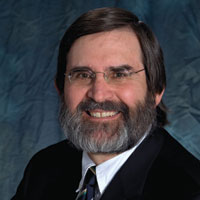

Distinguished Teaching Award
 Louis Wolcher
Louis Wolcher
Professor, School of Law
Lou Wolcher is famous for his stick figures - drawings and diagrams he uses in his classes, made up of simple shapes and imaginative representations. His Malpractice Mountain drawing, showing the various standards of care for medical malpractice suits, and the Pizza of Federal Jurisdiction, explaining areas of federal court authority, become vivid templates that help students understand difficult concepts. "I just found over the years that it's very efficient," Wolcher explains, "and most students appreciate having that kind of visual representation."
Wolcher has an innate ability to explain complicated concepts. According to one former student, he brings "arcane legal concepts to life with humor, poignancy, movie references, and a splash of colorful language."
That includes his famous Wolcherisms. Although he doesn't consciously do it, he often invents phrases that so precisely apply to a concept that the whole school picks them up. "Kill the puppy" is when a case goes to summary judgment and is not allowed to grow into a mature trial. "Poofify" refers to the negation of consent by certain factors, such as fraud or mistakes. And when he can only briefly mention a vast subject in class, he's giving "a photocopy of a picture of a wax replica of an hors d'oeuvre" of the topic.
These idiosyncratic teaching methods lay the groundwork for understanding legal concepts so the class can move on to the part that Wolcher really likes-thinking. "My main concern," Wolcher says, "is to get people to think."
Current events, such as tort reform and the Terry Schiavo case, often serve as jumping-off points to help students discuss the broader implications of legal theories. "What's really interesting is not how complicated the concepts are, but the social and moral questions that they attempt to resolve," he says.
One undergraduate student in an honors philosophy class writes that Wolcher "forced us to reconsider our thoughts at the most basic level. Just thinking about the questions Professor Wolcher might pose in response to my paper forced me to question even further." She adds, "Professor Wolcher encouraged the class to face controversial ethical and moral dilemmas, asking us to dissect and piece back together human nature. No subject was off limits, and he urged the entire class to examine issues from all sides."
Teaching, research, reading, writing and deeply contemplating what he's learned are Wolcher's favorite activities. He instills this passion for academics into his classroom work. "My love has always been philosophy and legal theory," he says. "That is always present, whatever I'm teaching. It's one of the things that is a constant anchor for all my endeavors."
He believes that law school should teach more than the skills of good, competent lawyering. Students, he believes, should take advantage of their last opportunity to really think about things before they have the pressure of jobs, clients and billable hours. "It's one of the great privileges and great gifts of Western civilization to have this university structure where we do more than just train people to be cogs in the machine," he says. "We train them to be thinking people and citizens."-Beth Luce